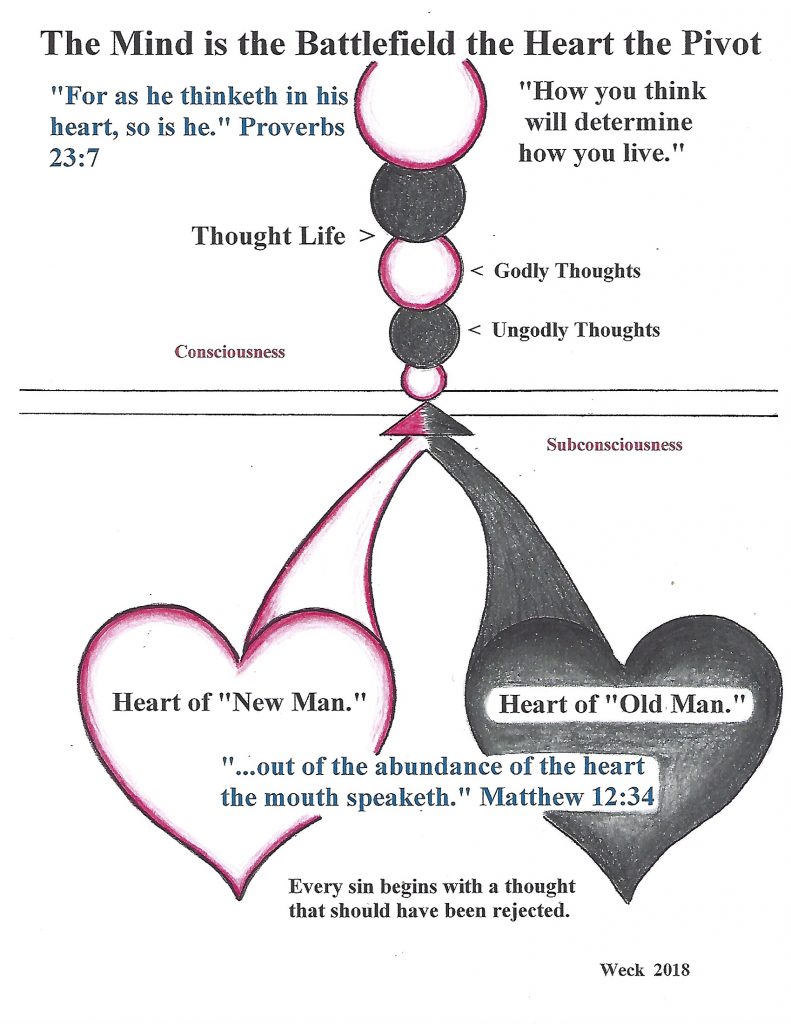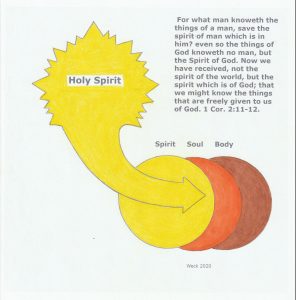The Mind is the Battlefield Nov. 2020
Pastor A.W. Weckeman.
New Creature in Christ
Upon repenting of our sin and trusting Christ’s substitutionary death, burial, and resurrection on our behalf, a miraculous “spiritual rebirth” occurs, a reversal of the “spiritual death” we inherited from Adam. In a split second, the Holy Spirit permanently reunites with the new believer’s spirit so that two become one “…he that is joined unto the Lord is one spirit.” (1 Cor.6:17)
Due to the second birth, every born-again believer truly is a “new creature in Christ,” sealed with the Holy Spirit, possessing a “divine nature” (“new man”) “Christ in you, the hope of glory” (Col. 1:27).
However, our old fleshly nature, which is contrary to God, is not eradicated upon salvation; unfortunately, he remains alive and active.
In reality, every believer is a “spiritual being” (“new man”) temporarily residing in the sin-prone flesh (“old man”): “An immortal life in dying flesh…a royal servant in a prison of clay” possessing a dual nature made up of two diametrically opposed forces contending for dominance. “For the flesh lusteth against the Spirit, and the Spirit against the flesh: and these are contrary the one to the other: so that ye cannot do the things that ye would.” (Gal.5:17)
The nature of the “new man” is animated by the Holy Spirit; therefore, He desires to love, obey, and please God.
The nature of the “old man” is that of the “flesh,” which manifests itself through self-centeredness, self-gratification, and self-righteousness. He is characterized by an attitude that is antagonistic to everything genuinely associated with God (although he will gladly wear the mask of religion to suit his self-righteousness) “Having a form of godliness, but denying the power thereof…” (2 Tim. 3:5). Rebelliousness, lust, worldliness, and pride are in his DNA. The “works of the flesh” (the old man) and “the fruit of the Spirit” (the new man) are contrasted in Gal.5:19-25:
19 “Now the works of the flesh are manifest, which are these; Adultery, fornication, uncleanness, lasciviousness, 20 Idolatry, witchcraft, hatred, variance, emulations, wrath, strife, seditions, heresies, 21 Envyings, murders, drunkenness, revellings, and such like: of the which I tell you before, as I have also told you in time past, that they which do such things shall not inherit the kingdom of God. 22 But the fruit of the Spirit is love, joy, peace, longsuffering, gentleness, goodness, faith, 23 Meekness, temperance: against such, there is no law. 24 And they that are Christ’s have crucified the flesh with the affections and lusts. 25 If we live in the Spirit, let us also walk in the Spirit.”
Understanding the Inner Struggle
At every level, the flesh exerts tremendous force on the will, continuously drawing us to disobedience by counteracting the Holy Spirit’s pull. The flesh employs temptation through carnal appetites and fleshly lusts, providing an endless list of excuses, continually seeking to override or neutralize the Holy Spirit’s influence. When moved by the Spirit to read the scriptures, pray, or worship, the flesh instantly distracts and deflects, reminding us of other things to do. Better things, more pleasurable pursuits inclined toward self-satisfaction.
In essence, the battle for control of the being is a tug-of-war between an inborn, well-established nature and an emerging new nature, intense as hand-to-hand combat. In this case, the battle is not physical; the mind is the arena of conflict where battles are won or lost.
The following verses provide the Apostle Paul’s personal account of the inner conflict between his old nature (sin-prone flesh) and the new nature (indwelling Holy Spirit). This critical portion of scripture explains the inner workings of an intense battle between two coexisting, diametrically opposed forces, the inevitable outcome of the second birth.
15 For that which I do I allow not: for what I would, that do I not; but what I hate, that do I. 16 If then I do that which I would not, I consent unto the law that it is good. 17 Now then it is no more I that do it, but sin that dwelleth in me.18 For I know that in me (that is, in my flesh,) dwelleth no good thing: for to will is present with me; but how to perform that which is good I find not. 19 For the good that I would I do not: but the evil which I would not, that I do. 20 Now if I do that I would not, it is no more I that do it, but sin that dwelleth in me. 21 I find then a law, that, when I would do good, evil is present with me. 22 For I delight in the law of God after the inward man: 23 But I see another law in my members, warring against the law of my mind, and bringing me into captivity to the law of sin which is in my members. 24 O wretched man that I am! who shall deliver me from the body of this death? 25 I thank God through Jesus Christ our Lord. So then with the mind I myself serve the law of God; but with the flesh the law of sin. (Rom. 7:15-25).
In the above verses, the Apostle Paul expresses his frustration with his inability to abstain from sin. He has a sincere desire to please God, yet he finds it impossible to do so in the power of his flesh. No matter how hard he tries, he inevitably fails: his self-will and determination are wholly insufficient. “For I delight in the law of God after the inward man: 23 But I see another law in my members, warring against the law of my mind, and bringing me into captivity to the law of sin which is in my members.
The realization that “Now then it is no more I that do it, but sin that dwelleth in me.18 For I know that in me (that is, in my flesh,) dwelleth no good thing…” is a wonderful, liberating truth. Humbly acknowledging our inability is the key to subduing the old nature; ironically, the battle is won by surrender. Jesus said, “the flesh profiteth nothing…” (John 6:63).
Walking in the flesh is to be controlled by our carnal appetites, ruled by our circumstances. It is to be motivated by “old man” ceding to the old nature, reacting to our emotions, and relying on our abilities and intellect rather than the indwelling Holy Spirit. “For we are the circumcision, which worship God in the spirit, and rejoice in Christ Jesus, and have no confidence in the flesh.” (Phip. 3:3).
The Heart of the Problem
As previously discussed, every true “born-again believer has two wells to draw from. Two contrary reservoirs of influence shape and determine thought life; one inherited from Adam, the other implanted by God upon salvation; two hearts, two minds resulting in two opposing wills.
The necessity of comprehending both source and nature of the two diametrically opposed forces responsible for the incessant inner struggle is of paramount importance. Our hearts’ spiritual condition is in direct proportion to our resistance to the flesh (through God’s power in us); therefore, it is crucial that we fully understand the nature of the enemy within. Learning to feed the “new man” while starving the “old man,” although essential, is only half the battle. Putting on the whole armor of God also involves understanding the mechanics (energy and forces) behind the warfare “Lest Satan should get an advantage of us: for we are not ignorant of his devices.” (2 Cor.2:11).
The way we live is closely related to our inner state. “Keep thy heart with all diligence; for out of it are the issues of life.” (Prov. 4:23). It is essential on many levels to understand how the inner man shapes the outer man. The following illustration depicts the heart of the problem; the two fountains responsible for our thought life.

The illustration should help us to understand the origin of the inner struggle and reality of the following verses:
The Heart of the “Old Man” (the natural man)
“The heart is deceitful above all things, and desperately wicked: who can know it?” (Jer. 17:9)
“He that trusteth in his own heart is a fool…” (Prov.28:26)
In Mark 7:18-23, the Lord Jesus reveals the fountainhead of evil thoughts and acts:
18 And he saith unto them, Are ye so without understanding also? Do ye not perceive, that whatsoever thing from without entereth into the man, it cannot defile him; 19 Because it entereth not into his heart, but into the belly, and goeth out into the draught, purging all meats? 20 And he said, That which cometh out of the man, that defileth the man. 21 For from within, out of the heart of men, proceed evil thoughts, adulteries, fornications, murders,22 Thefts, covetousness, wickedness, deceit, lasciviousness, an evil eye, blasphemy, pride, foolishness: 23 All these evil things come from within, and defile the man.
“And he said unto them, Why are ye troubled? and why do thoughts arise in your hearts.” (Luke 24:38).
“Out of the same mouth proceedeth blessing and cursing.” (James 3:10)
The Heart of the “New Man”
“Therefore if any man be in Christ, he is a new creature: old things are passed away; behold all things are become new.” (2 Cor. 5:17) “…Christ in you, the hope of glory…” (Col. 1:27b) “And because ye are sons, God hath sent forth the Spirit of his son into your hearts, crying, Abba, Father.” (Gal.4:6) It is impossible for the “new man” and the “old man” to peacefully coexist, hence the continuous mental tug-of-war.
The Mind is the Battlefield
“Wherefore gird up the loins of your mind…” (1 Peter 1:13). The analogy put forth in this verse provides valuable insight regarding the essential defense of the mind. The keyword is “loins,” which means the vital parts of the body, major organs protected in battle. A wound in this critical region was almost always fatal.
“For though we walk in the flesh, we do not war after the flesh: (For the weapons of our warfare are not carnal, but mighty through God to the pulling down of strong holds;) Casting down imaginations and every high thing that exhalteth itself against the knowledge of God, and bringing into captivity every thought to the obedience of Christ…” (2 Cor. 10:3-5). Notice the warlike terminology used by the Holy Spirit in these highly instructive verses; war, weapons, warfare, casting down, and captivity.
Consider the three main spheres of influence (strongholds, imaginations, and thoughts) detailed in the above verses concerning the spiritual battle for the mind:
Strongholds: Before salvation, we lived “according to the course of this world, according to the prince of the power of the air, the spirit that now worketh in the children of disobedience…” (Eph.2:2). During that time, the insidious influence of an ungodly society had thoroughly indoctrinated our way of thinking…conforming us to “this present evil world.” Over time, through repeated exposure, thought patterns were formed, and a worldview was established. The Bible refers to these carry-over captive areas of the mind, held by the devil and vigorously defended, as “strongholds.” These well-founded worldly attitudes are contrary to the teachings of God’s word and, unless “pulled down,” will add much resistance to spiritual growth. As new creatures in Christ, we are clearly warned by the Word of God not to be “conformed to this world” (Rom.12:2).
Imaginations: The LORD hates “An heart that devises wicked imaginations…“ (Prov.6:18). The word “imaginations” is mentioned six times in the scriptures and always carries a negative connotation. Consider (1 Chron.28:9, Prov. 6:18, Lam. 3:60-61, Rom.1:21, 2 Cor. 10:5). Imaginations: The ability to form mental pictures of something not actually present to the physical senses. Imaginations can be defined as spontaneous thoughts and mental images projected from the subconscious, stored thoughts and images arising from the sinful heart of the “old man”; fantasies, the sensuous free play of man’s sinful nature.
The first mention of “imagination” “And GOD saw that the wickedness of man was great in the earth, and that every imagination of the thoughts of his heart was only evil continually.” (Gen.6:5). Fallen man is “a transgressor from the womb…” (Isa.48:8), “…for the imagination of man’s heart is evil from his youth…” (Gen.8:21). It is vital to the Christian’s spiritual welfare (and usefulness to the Lord) that he or she learns to discern “…refuse the evil and choose the good…” (Isa.7:15).
Thoughts: “For as he thinketh in his heart, so is he…” (Prov.23:7). Every word, every action, begins as a thought. “Sow a thought, reap an act, Sow an act reap a habit, Sow a habit reap your character, Sow your character reap your destiny.” Charles Reade. Whatever rules our minds govern our lives. Our thoughts can sway the whole inner being in one direction or another; they are an accurate reflection of who we are. That which occupies the mind shapes the heart “for out of the abundance of the heart the mouth speaketh.” (Matt.12:34). “The language we employ is a sure index to the condition our souls.” Pink
All “thought” and “belief” belongs to one of two realms…the realm of truth or the realm of falsehood…each having its source in God or Satan.” Jessie Penn Lewis “War on the Saints”
13 “Who is a wise man and endued with knowledge among you? let him shew out of a good conversation his works with meekness of wisdom. 14 But if ye have bitter envying and strife in your hearts, glory not, and lie not against the truth. 15 This wisdom descendeth not from above, but is earthly, sensual, devilish.16 For where envying and strife is, there is confusion and every evil work.17 But the wisdom that is from above is first pure, then peaceable, gentle, and easy to be intreated, full of mercy and good fruits, without partiality, and without hypocrisy.” (James 3:13-17)
There are two types of wisdom in the world. One is born of Light, the other of darkness; one is from above, the other from below. The new man is animated by the wisdom from above, the old man by the wisdom from below. Spiritual growth depends on discernment and choice. The first challenge is to discern between the two types of wisdom. The second challenge is to choose between the two.
Thoughts, like almost everything else in life, are a matter of choices. Keeping your heart pure involves selectivity in the thought life and control of imagination. Thoughts are like food; some foods are beneficial, some are harmful, and many times that which looks or tastes good isn’t good. It is vital to our spiritual health and mental well-being that we choose wisely.
Learning to discern the nature and source of our beliefs and thoughts and be willing to make the necessary changes is pivotal. “He that hath no rule over his own spirit is like a city that is broken down, and without walls.” [defenseless] (Prov.25:28). If you don’t control your thoughts, your thoughts will control you. “…bringing into captivity every thought to the obedience of Christ…” “How long shall thy vain thoughts lodge within thee?” (Jer.4:14). “…choose you this day whom ye will serve.” (Josh. 24:15)
“We will remain the same until the pain of remaining the same becomes greater than the pain of change.” Unknown.
The Essential Exchange (“Put off” “Put on”)
Real spiritual growth is a choice, depending on a willingness to be changed, submission born out of sincere gratitude, and a heartfelt desire to obey the will of the Lord as revealed in His word. Spiritual development requires a retreat from self. “He must increase, but I must decrease” (John 3:30). The deciding factor, which determines whether we are carnal or spiritual, hinges on a crucial exchange:
“That ye put off concerning the former conversation [manner of living] the old man, which is corrupt according to the deceitful lusts; And be renewed in the spirit of your mind; And that ye put on the new man, which after God is created in righteousness and true holiness.” (Eph.4:22-24).
This putting off or yielding initiates an essential lifelong process whereby changed people learn to live changed lives, a gradual transformation that causes what happened on the inside becomes evident on the outside “Christ be formed in you…” (Gal.4:19).
Spirituality is the fruit of resistance; the more you choose to resist self-life (flesh), the more spiritual clarity and supply of God’s power you experience. However, it is of utmost importance to realize that we (in and of ourselves) do not possess the ability necessary to overcome the influence world, flesh, and devil.
Undoubtedly one of the most significant impediments to resisting the flesh and guarding the heart is to rely on our own strength, attempting to go it alone. The surest path to defeat is to forget, or be ignorant of, the fact that “…our sufficiency is of God” (2 Cor. 3:5). “But we have this treasure in earthen vessels, that the excellency of the power may be of God, and not of us.” (2 Cor. 4:7) “For it is God which worketh in you both to will and do of His good pleasure.” (Phil. 2:13) The power is in you yet not of you. There is a vast difference between a work “for God” and a work “of God.”
As far as overcoming the flesh and living a fruitful Christian life, the most important thing to realize is that Jesus Christ actually lives in you in the person of the Holy Spirit. “Christ in you, the hope of glory” (Col. 1:27). “And because ye are sons, God hath sent forth the Spirit of his son into your hearts, crying, Abba, Father” (Gal.4:6). Consider the Apostle Paul’s declaration in Galatians 2:20, “I am crucified with Christ: nevertheless I live; yet not I, but Christ liveth in me.”
Therein resides the power to resist temptation. Self-determination, in and of itself, is incapable of overcoming the flesh. Self-discipline is, of course, necessary, but it can only carry you so far; it is insufficient in the sense that we cannot will ourselves spiritually, we can only “yield” our will to God’s will “…not my will, but thine, be done” (Luke 22:42). Concerning spiritual matters, sheer determination because it is rooted in the flesh, is inadequate. The flesh cannot overcome the flesh; only the Holy Spirit can do that. “Are ye so foolish? having begun in the Spirit, are ye now made perfect by the flesh?” (Gal. 3:3)
No matter hard you try, you cannot serve God in the flesh, “the flesh profiteth nothing…” (John 6:63). Inconsistency is the enemy of spirituality; to consistently guard our hearts and overcome our enemies, we must beseech the Lord to supply the spiritual wisdom and necessary grace to live a life pleasing to Him. “Ask and it shall be given you…” (Matt.7:1).
“Except we are given grace we are but defenseless sinners.” Nee
The Eye Gate
To guard our hearts, we must control our eyes. The eye gate is the primary entrance to the mind. Eighty-nine percent of what we learn comes through visual stimulation, ten percent through audible stimulation, and one percent through the other three senses. Therefore the eye gate is of foremost concern and must be strictly guarded.
The eye gate is the primary pathway of enticement…the trigger of temptation. Temptation is a struggle between desire and reason which begins (activated) when (stimulus or influence) on the outside connects (through the eye gate) with something on the inside (old sinful nature), setting off a lustful response.
“But every man is tempted, when he is drawn away of his own lust, and enticed. Then when lust hath conceived, it bringeth forth sin: and sin, when it is finished, bringeth forth death” (James 1:14-15).
Must guard your heart by learning to recognize and “abstain from all appearance of evil.” Avoid that which provokes negative stimulation, and identify and shun your susceptibilities’ (areas of weakness); those things to which you have little resistance. “But put ye on the Lord Jesus Christ, and make not provision for the flesh, to fulfil the lusts thereof.” (Rom. 13:14). Acknowledging and shunning our vulnerabilities goes a long way to guarding our hearts.
Remember, the “eye gate” is the primary entrance to the soul. To guard your heart, you must control your eyes; a glimpse will lead to a gaze, imprinting an indelible image on the heart. “I will set no wicked thing before mine eyes…” (Ps. 101:3).
To illustrate: Eyes the projector, heart the screen, and mind the computer (memory). The eyes project indelible images upon the heart, which are then stored in the mind.
One of the most amazing features of the human mind is memory, which is, in effect, an incredible living computer. Man’s memory not only has the capability of recalling information and reviving past images but also has the capacity to create its own scenes in the form of dreams and imaginations from information stored in the subconscious. Adapted from “Improving Your Serve” C. Swindoll”
Whether before or after salvation, all evil entered through the unguarded eye-gate is permanently stored in the mind, thus providing the enemy internal poison to hinder the Holy Spirit. As each sensual, thought-provoking scene passes unchecked through the breach, the will to resist breaks down until the eye gate becomes the failed floodgate. The effect can be profound and lasting, adding much resistance and frustration to the battle for God’s control of the total being. Henceforth the Apostle Paul’s exhortations in 2 Cor.10:3-5 & Rom. 12:1-2:
“For though we walk in the flesh, we do not war after the flesh: (For the weapons of our warfare are not carnal, but mighty through God to the pulling down of strong holds;) Casting down imaginations and every high thing that exhalteth itself against the knowledge of God, and bringing into captivity every thought to the obedience of Christ…” (2 Cor. 10:3-5).
“I beseech you therefore, brethren, by the mercies of God, that ye present your bodies a living sacrifice, holy, acceptable unto God, which is your reasonable service. And be not conformed to this world: but be ye transformed by the renewing of your mind, that ye may prove what is that good, and acceptable, and perfect, will of God.” (Rom.12:1-2)
“Who is wise, and he shall understand these things? prudent, and he shall know them? for the ways of the LORD are right, and the just shall walk in them: but the transgressors shall fall therein.” (Hos. 14:9)








